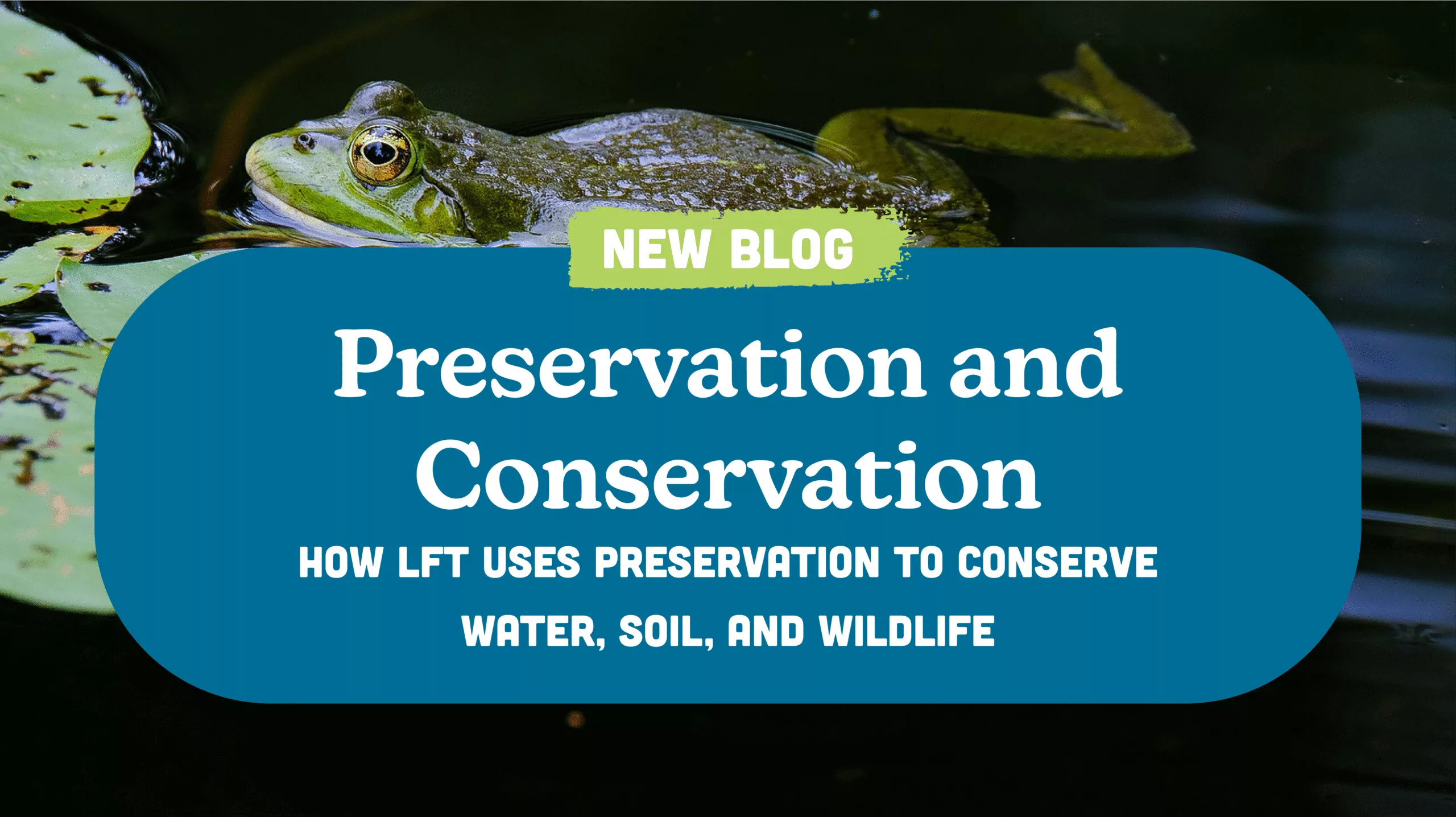Preservation and Conservation

This Water Week, we’re reminded our agricultural landscape not only offers beautiful views and fresh food but also plays a huge role in water quality! That’s why we work with farmers to protect their land, implement Best Management Practices (BMPs), and restore the waterways that sustain our home.
But why do we care so much about water, and how does preservation of farmland conserve it? This week, we’re diving into how preservation, conservation, and stewardship protect our watersheds and save the Chesapeake Bay.
Why Water?
You might be thinking, “Why put so much work into water?”
As a land trust, it may be challenging to understand why LFT invests so much time and effort in conservation. The truth is the quality of our water in Lancaster doesn’t just affect Lancaster’s resources and wildlife. It also affects the Chesapeake Bay and all of its ecosystems.
The bad news? Lancaster County is Pennsylvania’s largest contributor to the Chesapeake Bay’s pollution, accounting for 22% of Pennsylvania-related pollution. Unfortunately, the vast majority (80%) of that 22% is linked to farmland.
The good news? Many farmers in Lancaster County want to implement conservation practices on their properties but lack the time, resources, and funding to do so. Currently, LFT has a list of 55 farmers waiting for funding to complete their conservation projects.
One of the problems is that the solution isn’t simple – there are not a few large farms where conservation practices would make a significant impact on water quality. Lancaster’s idyllic farmland is made up of thousands of small private farms. “There is no big fish,” says Amy, “there are hundreds of small, privately owned farms that we want to reach. It’s what makes our farmland so special and beautiful, but it also contributes to the persistence of the problem.”
That’s why we work alongside farmers to help them access the resources they need to enhance conservation efforts on their properties. To date, our work on farms has removed 250,000 pounds of nitrogen from Lancaster’s waterways, thereby improving water quality and protecting local ecosystems.
While we’ve made great progress, we still have a lot of work to do, and we believe that work begins with preservation.
Preservation and Conservation
While many types of conservation efforts exist, farmland preservation itself is becoming more recognized as a tool for conservation.
But how?
First, farms have high infiltration potential. Water and other nutrients infiltrate our soil, making it some of the most productive non-irrigated soil in the country. High infiltration also recharges groundwater, reduces erosion, and improves plant growth. Both the community and the environment benefit! However, when that soil is paved over, we lose fresh produce, beautiful views, and these environmental benefits. Preserving farmland ensures that soil is available for infiltration and groundwater recharge forever.
Second, when a farm is protected, all of it is protected. That includes streams and woodland, where many species of plants and animals create habitats. Saving this land protects those habitats, keeping important ecosystems in place.
However, our work in conservation goes beyond simply preserving the farm. “Since these farms will be around forever, we want to ensure they’re sustainable,” notes Amy.
When a farmer preserves their land, they become friends and champions in LFT. We value those relationships, working together to implement improved conservation efforts on preserved farms. Our staff members are knowledgeable in agriculture and conservation, bridging the gap between the two for smoother project management and creating trust with our farmers. Maintaining these relationships and helping farmers improve their operations is a big part of stewardship at LFT.
“If our farms will be around forever, they should be sustainable. That’s why conservation efforts on preserved farms are so important – those BMPs will benefit the environment forever.”
Looking Ahead
Today, we’ve protected over 37,000 acres of productive farmland. LFT staff members have completed over 2,000 outreach visits, discussing potential conservation opportunities with farmers across the county.
We still have work to do! This year, we hope to preserve more properties, implement more BMPs, and complete more outreach visits. However, we can’t do this alone! Here’s how you can help:
Volunteer with Us
Volunteering with LFT and other preservation or environmental organizations is a great way to get outside, make a difference in your community, and connect with others!
Simply Give
At LFT, 90 cents of every dollar donated is invested directly into the preservation or stewardship of farmland in Lancaster County. We want to ensure that your gift is making the biggest impact possible!
Spread the Word
Social media is a powerful tool. Spread the word to friends and family by liking and sharing our posts on Instagram, Facebook, and LinkedIn. Sharing our posts helps to share our mission with Lancastrians who may not have heard of us before!
Attend Local Township Meetings
Local township meetings are open to the public and are an easy way to stay in the know and let your voice be heard about development in your community.
Buy Local
Buying local is better for our environment, community, and local farms! Click here to check out preserved farm stands and markets you can get your produce this week.
Keeping local waterways healthy doesn’t only benefit Lancaster—it affects the health and well-being of the Chesapeake Bay. That’s why our work at Lancaster Farmland Trust goes beyond protecting scenic views or agricultural heritage; it’s about building a sustainable future. By preserving, conserving, and stewarding land, we help to protect and invest in resources that will benefit our community and planet for generations. To learn more about our work in conservation, click here. To learn more about this year’s Water Week lineup, click here.
